广州六年级下册英语
广州教科版六下英语教案

广州教科版六下英语教案Title: Lesson Plan for Grade 6 English Textbook of Guangzhou Education Edition。
Objective:By the end of this lesson, students will be able to:1. Understand and use the new vocabulary related to daily activities.2. Use the present continuous tense to talk about actions happening now.3. Develop their speaking and listening skills through group discussions and role plays.Materials:Textbook: Grade 6 English Textbook of Guangzhou Education Edition。
Whiteboard and markers。
Flashcards of new vocabulary words。
Pictures or realia related to daily activities。
Procedure:1. Warm-up (10 minutes)。
Greet the students and ask them about their favorite daily activities. Write their responses on the board.Show pictures or realia related to daily activities and ask students to identify them and say the corresponding vocabulary words.2. Presentation of New Vocabulary (15 minutes)。
新教科版(广州)英语六年级下册全册知识点归纳
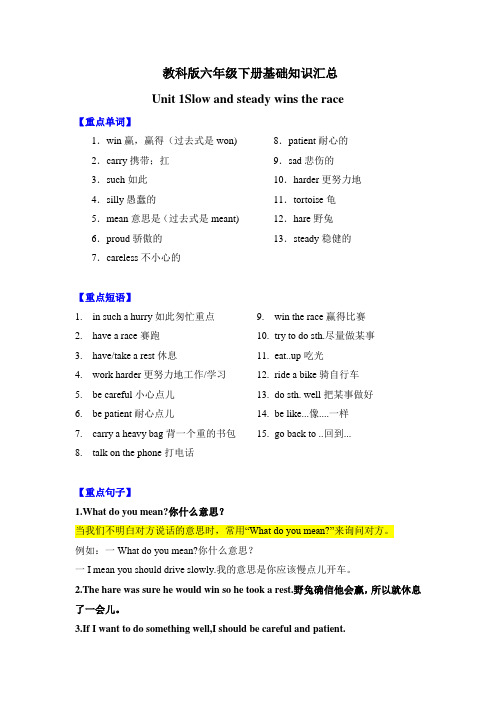
教科版六年级下册基础知识汇总Unit 1Slow and steady wins the race 【重点单词】1.win赢,赢得(过去式是won) 2.carry携带;扛3.such如此4.silly愚蠢的5.mean意思是(过去式是meant) 6.proud骄傲的7.careless不小心的8.patient耐心的9.sad悲伤的10.harder更努力地11.tortoise龟12.hare野兔13.steady稳健的【重点短语】1.in such a hurry如此匆忙重点2.have a race赛跑3.have/take a rest休息4.work harder更努力地工作/学习5.be careful小心点儿6.be patient耐心点儿7.carry a heavy bag背一个重的书包8.talk on the phone打电话9.win the race赢得比赛10.try to do sth.尽量做某事11.eat..up吃光12.ride a bike骑自行车13.do sth. well把某事做好14.be like...像....一样15.go back to ..回到...【重点句子】1.What do you mean?你什么意思?当我们不明白对方说话的意思时,常用“What do you mean?”来询问对方。
例如:一What do you mean?你什么意思?一I mean you should drive slowly.我的意思是你应该慢点儿开车。
2.The hare was sure he would win so he took a rest.野兔确信他会赢,所以就休息了一会儿。
3.If I want to do something well,I should be careful and patient.如果我想做好某件事,我应该细心点儿,并且要耐心点儿。
2024年广州版英语六年级下册Unit9《Wherewillyougo》课件2

Sydney Harbour Bridge (悉尼海港大桥)
Sydney Harbour Bridge is famous for Sydney ,too.
Tokyo 东京
Tokyo is the capital city of Japan. Tokyo is a great place to go shopping.
New Zealand kiwi
The USA Washington D.C. White House(白宫)
New Zealand Wellington(惠灵顿)
都二
能分
运浇
用灌
好,
“八
二分
八等
定待
律;
”二
,分
我管
们教
一,
起八
,分
静放
待手
花;
开二
。分
成
➢ Pure of heart, life is full of sweet and joy!
Wellington(惠灵顿)
Wellington is the capital of NewZealand.
I'd like to walk on the beach in Wellington.
kiwi
几维鸟
New Zealand is
famous for kiwi
London is the capital of the UK.
绩 ,
八
分
方
法
。
愿
全
天
下
所
有
父
母
我们,还在路上……
广州六年级下 英语知识点
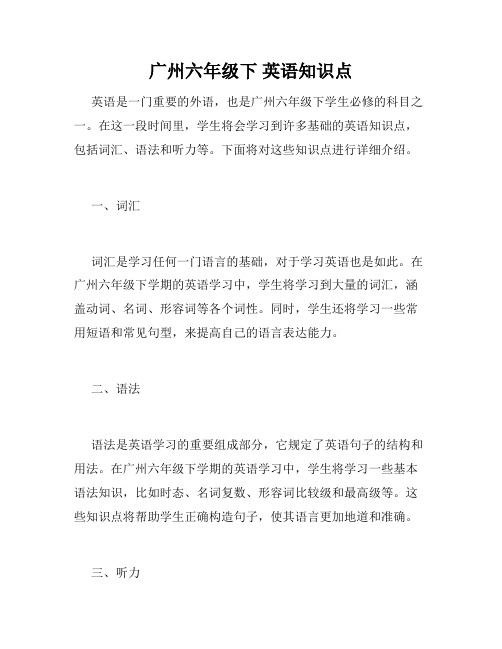
广州六年级下英语知识点英语是一门重要的外语,也是广州六年级下学生必修的科目之一。
在这一段时间里,学生将会学习到许多基础的英语知识点,包括词汇、语法和听力等。
下面将对这些知识点进行详细介绍。
一、词汇词汇是学习任何一门语言的基础,对于学习英语也是如此。
在广州六年级下学期的英语学习中,学生将学习到大量的词汇,涵盖动词、名词、形容词等各个词性。
同时,学生还将学习一些常用短语和常见句型,来提高自己的语言表达能力。
二、语法语法是英语学习的重要组成部分,它规定了英语句子的结构和用法。
在广州六年级下学期的英语学习中,学生将学习一些基本语法知识,比如时态、名词复数、形容词比较级和最高级等。
这些知识点将帮助学生正确构造句子,使其语言更加地道和准确。
三、听力听力是学习英语时必不可少的技能之一。
通过听力训练,学生可以提高自己的听力理解和口语表达能力。
在广州六年级下学期的英语学习中,学生将接触到更多的英语听力材料,包括日常对话、短文和文章等。
通过大量的听力练习,学生可以提高自己的听力水平,更好地理解和运用所学知识。
四、阅读阅读是提高英语综合能力的重要方法之一。
通过阅读,学生可以学习到更多的词汇和语法知识,并且加深对语言运用的理解。
在广州六年级下学期的英语学习中,学生将接触到一些简单的英语阅读材料,包括短文和故事等。
通过阅读练习,学生可以提高自己的阅读理解能力和英语表达能力。
五、口语口语是学习英语最重要的部分之一,也是学生运用所学知识的关键环节。
在广州六年级下学期的英语学习中,学生将通过学习课本中的对话和句型,来提高自己的口语表达能力。
同时,学生还可以通过与同学进行英语对话、说英语角等方式来加强口语训练。
总结:广州六年级下学期的英语学习将涉及到词汇、语法、听力、阅读和口语等多个方面的知识点。
通过系统的学习和不断的练习,学生可以提高自己的英语水平,更好地运用所学知识。
同时,学生还可以通过参加英语角、阅读英语原版书籍等方式,来拓宽自己的英语视野。
广州版英语六年级下册unit6课文

广州版英语六年级下册unit6课文Unit 6 Our World。
In Unit 6 of the sixth grade English textbook in Guangzhou, students are introduced to the theme "Our World". This unit covers topics such as different countries, cultures, traditions, and celebrations around the world. Through this unit, students will gain a deeper understanding of the diversity and beauty of our world.The first part of the unit focuses on introducing students to different countries and their cultures. Students will learn about countries such as China, the United States, France, and Japan. They will explore the unique characteristics of each country, including their language, food, clothing, and traditions. By studying different countries, students will develop a broader perspective and appreciation for the world around them.In the second part of the unit, students will delve into the topic of celebrations around the world. They will learn about various festivals and holidays celebrated in different countries, such as Chinese New Year, Thanksgiving, Bastille Day, and Hanami. Through learning about these celebrations, students will not only expand their cultural knowledge but also learn to appreciate and respect the diversity of traditions and customs.Furthermore, students will also have the opportunity to compare and contrast different countries and cultures. They will explore similarities and differences between countries in terms of geography, climate, traditions, and lifestyles. By making these comparisons, students will develop critical thinking skills and learn to appreciate the uniqueness of each culture.In addition to learning about different countries and cultures, students will also have the chance to participate in various activities related to the unit. They may engage in role-playing exercises, group discussions, and creative projects that allow them to apply their knowledge and express their ideas. These activities will not only reinforce their learning but also enhance their communication and collaboration skills.Overall, Unit 6 "Our World" provides students with a comprehensive and engaging exploration of the diverse cultures and traditions that make up our world. By studying different countries, celebrations, and customs, students will develop a global perspective, empathy, and respect for cultural diversity. This unit aims to broaden students' horizons, foster their curiosity, and inspire them to become informed and open-minded global citizens. Through this unit, students will not only learn about the world but also learn to appreciate and celebrate its rich tapestry of cultures.。
广州版教材英语六年级(下)
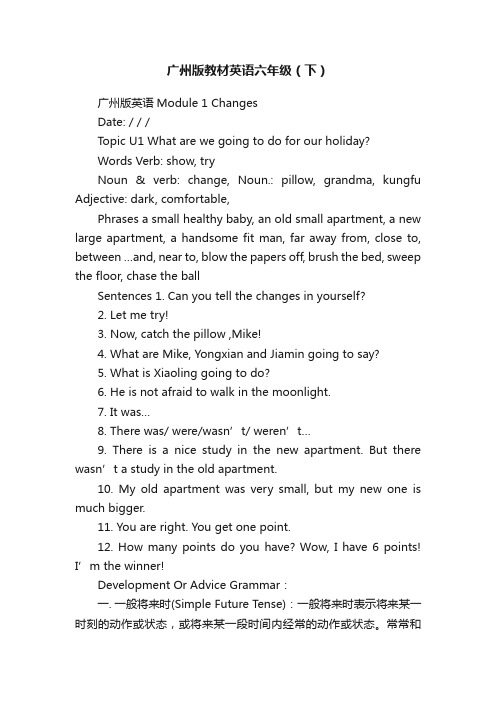
广州版教材英语六年级(下)广州版英语Module 1 ChangesDate: / / /Topic U1 What are we going to do for our holiday?Words Verb: show, tryNoun & verb: change, Noun.: pillow, grandma, kungfu Adjective: dark, comfortable,Phrases a small healthy baby, an old small apartment, a new large apartment, a handsome fit man, far away from, close to, between …and, near to, blow the papers off, brush the bed, sweep the floor, chase the ballSentences 1. Can you tell the changes in yourself?2. Let me try!3. Now, catch the pillow ,Mike!4. What are Mike, Yongxian and Jiamin going to say?5. What is Xiaoling going to do?6. He is not afraid to walk in the moonlight.7. It was…8. There was/ were/wasn’t/ weren’t…9. There is a nice study in the new apartment. But there wasn’t a study in the old apartment.10. My old apartment was very small, but my new one is much bigger.11. You are right. You get one point.12. How many points do you have? Wow, I have 6 points! I’m the winner!Development Or Advice Grammar:一. 一般将来时(Simple Future Tense):一般将来时表示将来某一时刻的动作或状态,或将来某一段时间内经常的动作或状态。
(完整版)广州版小学英语六年级下册英语课文
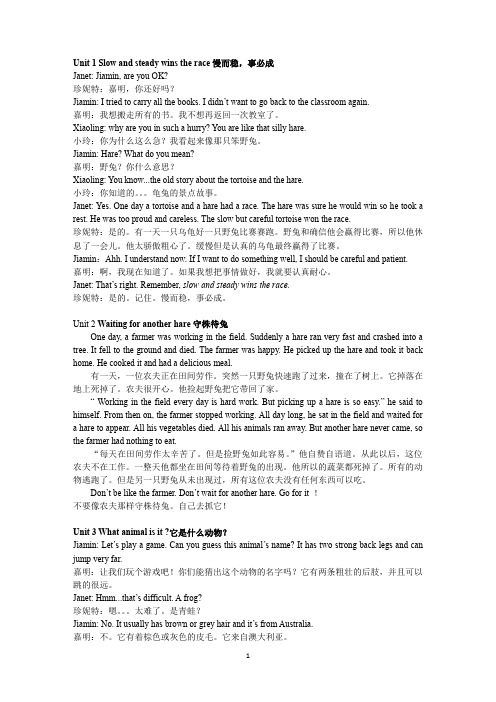
Unit 1 Slow and steady wins the race慢而稳,事必成Janet: Jiamin, are you OK?珍妮特:嘉明,你还好吗?Jiamin: I tried to carry all the books. I didn’t want to go back to the classroom again.嘉明:我想搬走所有的书。
我不想再返回一次教室了。
Xiaoling: why are you in such a hurry? You are like that silly hare.小玲:你为什么这么急?我看起来像那只笨野兔。
Jiamin: Hare? What do you mean?嘉明:野兔?你什么意思?Xiaoling: You know...the old story about the tortoise and the hare.小玲:你知道的。
龟兔的景点故事。
Janet: Yes. One day a tortoise and a hare had a race. The hare was sure he would win so he took a rest. He was too proud and careless. The slow but careful tortoise won the race.珍妮特:是的。
有一天一只乌龟好一只野兔比赛赛跑。
野兔和确信他会赢得比赛,所以他休息了一会儿。
他太骄傲粗心了。
缓慢但是认真的乌龟最终赢得了比赛。
Jiamin:Ahh. I understand now. If I want to do something well, I should be careful and patient.嘉明:啊,我现在知道了。
如果我想把事情做好,我就要认真耐心。
Janet: That’s right. Remember, slow and steady wins the race.珍妮特:是的。
广州最新版小学六年级英语下册知识点归纳和习题(全册)

广州版小学六年级英语下册知识点归纳和习题Unit 1 slow and steady wins the race一、课前小测1.稳健的_____________________2.赢_____________________3.尝试_____________________4.携带、扛_______________5.如此匆忙_____________________6.讲电话________________7.意思是_____________________ 8.骄傲的__________________9.不小心的_____________________ 10.耐心的________________11.记住_____________________ 12.悲伤的_______________13.努力地_____________________ 14.更努力______________二、词组记得牢in a hurry 匆忙in such a hurry 如此匆忙be like 像??一样be patient 耐心点talk on the phone 讲电话carry a heavy bag 背很重的包work harder 更努力地工作或学习slow and steady 稳打稳扎三、要点难点都知道1.try to do something 努力做某事,如She tried to eat with his left hand because his right hand was broken.因为右手受伤了所以她努力用左手吃饭。
2.in a hurry 匆忙、着急如:In the morning, everybody is in a hurry.早上的时候每个人都很匆忙。
3. You are like that silly hare.Like 像??一样,如:The flower is like a cup. 这花像一个茶杯。
(完整)广州版小学英语六年级下册单词表

广州版小学英语六年级下册单词表Unit1 Slow and steady wins the race steady adv. 稳健的win v. 赢,赢得(woncarry v. 携带;扛such adj. 如此in such hurry 如此勿忘silly adj. 愚蠢的hare n. 野兔mean v. 意思是(meant)tortoise n. 龟proud adj. 骄傲的careless adj. 不小心的patient adj. 耐心的remember v. 记住sad adj. 悲伤的harder adv. 更努力地Unit2 Waitinganother pron. 另一个crash v. 碰撞into prep. 到;到......上ground n. 地面die v. 死pick up 捡起easy adj. 容易himself pron. 他自己from then on 从那时候起stop v. 停止all day long 整天appear v. 出现go for it 努力吧; 加油happen to v. 发生(于)Unit 3 What animal is it?difficult adj. 困难的frog n. 青蛙kangaroo n. 袋鼠turn n. 轮回; 轮到的机会ocean n. 海洋starfish n. 海星Africa n. 非洲tiger n. 老虎Asia n. 亚洲be called 被称为lion n. 狮子panda n. 熊猫bamboo n. 竹子elephant n. 象giraffe n. 长颈鹿neck n. 脖子leaf n. 树叶(leaves)Unit 4 We can save the animals save v. 拯救;节省only adj. 唯一的;仅仅earth n. 地球whale n. 鲸鱼danger n. 危险in danger 处于危险中disappear v. 消失forever adv. 永远forest n. 森林pollute v. 污染made v. 制造(make的过去式)make from 用......制造fur n. 皮毛see n. 海洋Uint 5 Dr Sun Yatsenfamous adj. 著名的Dr=doctor 医生;博士person n. 人history n. 历史leader n. 领袖free v. / adj 使......自由inventor n. 发明家invent v. 发明bulb n. 灯泡light bulb n. 灯泡actor n. (男)演员movie n. 电影musician n. 音乐家Unit 6 Steve JobsiPad n. 平板电脑probably adv. 或许come true 变成现实company n. 公司game-maker n. 游戏(机)制造者once adv&conj 一次once again 再一次successful adj. 成功return v. 回到bigget adj. 最大的iPod n. 大容量播放器iPhone n. 掌上智能手机Unit 7 It's the polite thing to do manner n. 礼貌seat n. 座位impolite adj. 没有礼貌的in need 需要(的时候)as conj. 当......的时候line n. 队in line 排队push v. 推push in 插队full adj. 满的dish n. 盘子;碟子laugh v. 大笑laugh at 嘲笑Help yourself to ... 随便吃点...... throw v. 扔;掉(threw)Unit 8 The magic wordsmagic adj. 魔术word n. 词;话语long ago 很久以前sign n. 指示牌none pron. 没有人upset adj. 失望;难过bottom n. 底部inside adv. 在里面dark adj.黑暗expect conj. 除了expect for 除......以外carry on with 进行light v. 点然light up 点亮brightly adv. 明亮地lead v. 指引brought v. 带;携带(bring)ever adv. 永远;曾经Unit 9 Where will you go?abroad adv. 在国外South Africa n. 南非nature n. 大自然choose v. 选择(过chose)Sydney n. 悉尼opera n. 歌剧Sydney Opera House 悉尼歌剧院harbour n. 海港bridge n. 桥Sydney Harbour Bridge 悉尼海港大桥Japan n. 日本Tokyo n. 东京France n. 法国Paris n. 巴黎capital n. 首都Washington D.C. 华盛顿哥伦比亚区White House (美国)白宫tower n. 塔Tower bridge n. 塔桥Big Ben 大本钟New Zealand n. 新西兰Willington n. 惠灵顿kiwi n. 几维鸟Canada n. 加拿大Ottawa n. 渥太华maple n. 枫树flag n. 旗10 I can’t wait to see younature adj. 自然的beauty n. 美景waterfall n. 瀑布Chinatown n. 唐人街Toronto n. 多伦多passport n. 护照book v. 订购ticket n. 票airport n. 飞机场land v. 着陆;n. 陆地。
(完整word版)广州版小学英语六年级下册英语课文
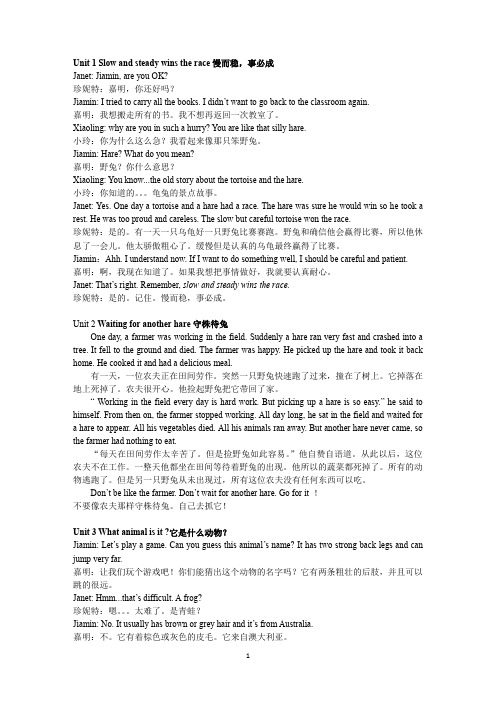
Unit 1 Slow and steady wins the race慢而稳,事必成Janet: Jiamin, are you OK?珍妮特:嘉明,你还好吗?Jiamin: I tried to carry all the books. I didn’t want to go back to the classroom again.嘉明:我想搬走所有的书。
我不想再返回一次教室了。
Xiaoling: why are you in such a hurry? You are like that silly hare.小玲:你为什么这么急?我看起来像那只笨野兔。
Jiamin: Hare? What do you mean?嘉明:野兔?你什么意思?Xiaoling: You know...the old story about the tortoise and the hare.小玲:你知道的。
龟兔的景点故事。
Janet: Yes. One day a tortoise and a hare had a race. The hare was sure he would win so he took a rest. He was too proud and careless. The slow but careful tortoise won the race.珍妮特:是的。
有一天一只乌龟好一只野兔比赛赛跑。
野兔和确信他会赢得比赛,所以他休息了一会儿。
他太骄傲粗心了。
缓慢但是认真的乌龟最终赢得了比赛。
Jiamin:Ahh. I understand now. If I want to do something well, I should be careful and patient.嘉明:啊,我现在知道了。
如果我想把事情做好,我就要认真耐心。
Janet: That’s right. Remember, slow and steady wins the race.珍妮特:是的。
广州版小学英语六年级下册课文教材(全)
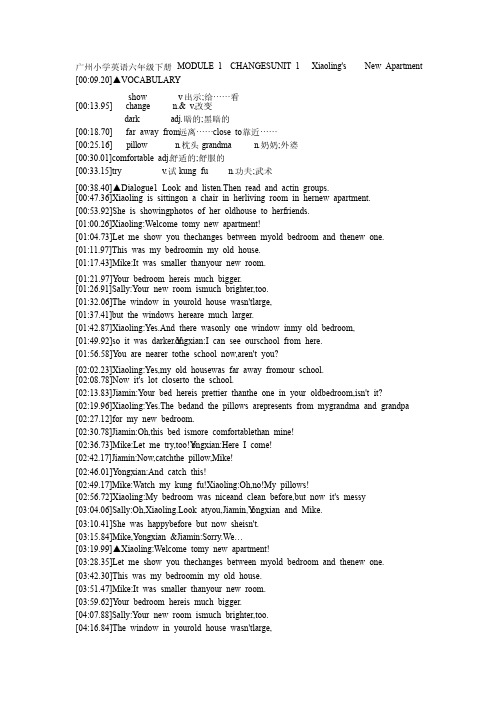
广州小学英语六年级下册广州小学英语六年级下册 MODULE 1 CHANGESUNIT 1 Xiaoling's New Apartment [00:09.20]▲VOCABULARYshow v 出示;给……看给……看 [00:13.95] change n.& v.改变改变dark adj.暗的;黑暗的黑暗的[00:18.70] far away from 远离……close to 靠近……靠近……[00:25.16] pillow n.枕头grandma n.奶奶;外婆外婆[00:30.01]comfortable adj.舒适的;舒服的舒服的[00:33.15]try v .试kung fu n.功夫;武术武术[00:38.40]▲Dialogue1 Look and listen.Then read and actin groups. [00:47.36]Xiaoling is sittingon a chair in herliving room in hernew apartment. [00:53.92]She is showingphotos of her oldhouse to herfriends. [01:00.26]Xiaoling:Welcome tomy new apartment! [01:04.73]Let me show you thechanges between myold bedroom and thenew one. [01:11.97]This was my bedroomin my old house. [01:17.43]Mike:It was smaller thanyour new room. [01:21.97]Y our bedroom hereis much bigger. [01:26.91]Sally:Y [01:26.91]Sally:Your new room ismuch brighter,too. our new room ismuch brighter,too. [01:32.06]The window in yourold house wasn'tlarge, [01:37.41]but the windows hereare much larger. [01:42.87]Xiaoling:Yes.And there wasonly one window inmy old bedroom, [01:49.92]so it was darker.Y o ngxian:I can see ourschool from here. ongxian:I can see ourschool from here. [01:56.58]Y ou are nearer tothe school now,aren't you? [02:02.23]Xiaoling:Yes,my old housewas far away fromour school. [02:08.78]Now it's lot closerto the school. [02:13.83]Jiamin:Y [02:13.83]Jiamin:Your bed hereis prettier thanthe one in your oldbedroom,isn't it? our bed hereis prettier thanthe one in your oldbedroom,isn't it? [02:19.96]Xiaoling:Yes.The bedand the pillows arepresents from mygrandma and grandpa [02:27.12]for my new bedroom. [02:30.78]Jiamin:Oh,this bed ismore comfortablethan mine![02:36.73]Mike:Let me try,too!Y ongxian:Here I come! [02:42.17]Jiamin:Now,catchthe pillow,Mike![02:46.01]Y ongxian:And catch this! [02:49.17]Mike:Watch my kung fu!Xiaoling:Oh,no!My pillows! [02:56.72]Xiaoling:My bedroom was niceand clean before,but now it's messy . [03:04.06]Sally:Oh,Xiaoling.Look atyou,Jiamin,Y ongxian and Mike. [03:10.41]She was happybefore but now sheisn't. [03:15.84]Mike,Y ongxian &Jiamin:Sorry.We…[03:19.99]▲Xiaoling:Welcome tomy new apartment! [03:28.35]Let me show you thechanges between myold bedroom and thenew one. [03:42.30]This was my bedroomin my old house. [03:51.47]Mike:It was smaller thanyour new room. [03:59.62]Y our bedroom hereis much bigger. [04:07.88]Sally:Y [04:07.88]Sally:Your new room ismuch brighter,too. our new room ismuch brighter,too. [04:16.84]The window in yourold house wasn'tlarge, [04:27.18]but the windows hereare much larger. [04:36.43]Xiaoling:Yes.And there wasonly one window inmy old bedroom, [04:48.29]so it was darker.Y o ngxian:I can see ourschool from here. ongxian:I can see ourschool from here. [05:01.04]Y ou are nearer tothe school now,aren't you? [05:10.20]Xiaoling:Yes,my old housewas far away fromour school. [05:22.56]Now it's lot closerto the school. [05:31.60]Jiamin:Y [05:31.60]Jiamin:Your bed hereis prettier thanthe one in your oldbedroom,isn't it? our bed hereis prettier thanthe one in your oldbedroom,isn't it? [05:45.47]Xiaoling:Yes.The bedand the pillows arepresents from mygrandma and grandpa [06:02.00]for my new bedroom. [06:07.44]Jiamin:Oh,this bed ismore comfortablethan mine! [06:17.29]Mike:Let me try,too!Y ongxian:Here I come! [06:27.63]Jiamin:Now,catchthe pillow,Mike! [06:35.08]Y ongxian:And catch this! [06:41.03]Mike:Watch my kung fu!Xiaoling:Oh,no!My pillows! [06:55.19]Xiaoling:My bedroom was niceand clean before,but now it's messy . [07:09.04]Sally:Oh,Xiaoling.Look atyou,Jiamin,Y ongxian and Mike. [07:23.09]She was happybefore but now sheisn't. [07:33.15]Mike,Y ongxian &Jiamin:Sorry.We…UNIT 2 A Lovely Baby [00:04.39]▲VOCABULARY album n.集just adv.仅仅;刚刚刚刚[00:11.55]healthy adj.健康的naughty adj.调皮的调皮的[00:16.48]trouble n.麻烦in trouble 遇到麻烦遇到麻烦[00:20.92]gosh interj.天啊;哎呀footballer n.足球运动员足球运动员[00:25.78]fit adj.适合的;适当的;壮健的壮健的[00:28.63]become n.成为;变成(过去式became/bI'keIm/) [00:31.48]player 选手;运动员good-looking adj.好看的好看的好看的 [00:36.34]diet n.(以减肥、治病为目的的特种)饮食饮食[00:39.29]go on a diet 实行饮食疗法;节食节食 [00:43.23]student n.学生ago adj.在……之前在……之前[00:48.20]▲Dialogue1 Look and listen.Then read and actin groups. [00:57.65]Ben and Janet arelooking at a familyalbum with theirparents. [01:06.01]Ben:Is this Janet,Mum? [01:09.67]Mrs Webb:Y es,she was justtwo years old. [01:15.21]Janet:I was very small. [01:19.46]Mrs Webb:Y ou were abeautiful,healthybaby,Janet, [01:25.32]with blonde hairand blue eyes. [01:30.36]Ben:What about me,Mum?Was I a lovelybaby? [01:35.79]Mrs Webb:Y ou were lovely tolook at,but youwere very naughty , [01:41.85]and you were alwaysin trouble. [01:46.29]Ben:Really?Gosh! [01:50.03]Mr Webb:Unc [01:50.03]Mr Webb:Uncle Philip was afamous footballer.le Philip was afamous footballer.[01:54.39]Now he isn't firor strong. [01:58.94]Janet:I like him.He'skind and funny.He has nice eyes. [02:05.78]Ben:When did he becomea manager?Mr Webb:In 1990. [02:12.21]Ben:Were you a greatfootballer,Dad? [02:16.54]Mr Webb:No,Ben,I wasn't.Iwas a tennis playerwhen I was young. [02:22.71]Ben:Were you famous?Mr Webb:No,I wasn't. [02:27.85]Ben:When did you becomea doctor?Mr Webb:In 1982. [02:33.60]Mrs Webb:Aunt Pat was slimand beautiful,butnow she's heavy. [02:40.65]Janet:I think she's verygood-looking. [02:44.70]Mrs Webb:I was quitethin then.Now I'mheavier. [02:50.63]Pat and I shouldboth go on a diet!Ben:No,you needn't. [02:58.18]Janet:Y [02:58.18]Janet:You're still so fit.Mrs Webb:Thank you. ou're still so fit.Mrs Webb:Thank you. [03:03.61]▲Ben:Is this Janet,Mum? [03:09.57]Mrs Webb:Y es,she was justtwo years old. [03:18.92]Janet:I was very small. [03:25.79]Mrs Webb:Y ou were abeautiful,healthybaby,Janet, [03:35.43]with blonde hairand blue eyes. [03:43.79]Ben:What about me,Mum?Was I a lovelybaby? [03:57.56]Mrs Webb:Y ou were lovely tolook at,but youwere very naughty , [04:09.31]and you were alwaysin trouble. [04:17.25]Ben:Really?Gosh! [04:25.22]Mr Webb:Unc [04:25.22]Mr Webb:Uncle Philip was afamous footballer.le Philip was afamous footballer.[04:35.07]Now he isn't firor strong. [04:43.43]Janet:I like him.He'skind and funny.He has nice eyes. [05:00.38]Ben:When did he becomea manager?Mr Webb:In 1990. [05:12.92]Ben:Were you a greatfootballer,Dad? [05:19.97]Mr Webb:No,Ben,I wasn't.Iwas a tennis playerwhen I was young. [05:35.12]Ben:Were you famous?Mr Webb:No,I wasn't. [05:45.16]Ben:When did you becomea doctor?Mr Webb:In 1982. [05:58.09]Mrs Webb:Aunt Pat was slimand beautiful,butnow she's heavy. [06:10.76]Janet:I think she's verygood-looking. [06:18.41]Mrs Webb:I was quitethin then.Now I'mheavier. [06:30.45]Pat and I shouldboth go on a diet!Ben:No,you needn't. [06:44.51]Janet:Y [06:44.51]Janet:You're still so fit.Mrs Webb:Thank you. ou're still so fit.Mrs Webb:Thank you. Unit 3 Let's GoFurther [00:05.30]Story Time [00:08.31]Listen and read thestory . [00:12.25]Piggy was lazybefore. [00:16.69]He liked playingcomputer games, [00:21.42]but he didn'tlike doinghomework. [00:25.97]He didn't clean hisbedroom.His bedroom wasmessy . [00:33.12]One morning,Piggycouldn't find hissocks,shoes orschool uniform. [00:42.27]He was late forschool. [00:46.63]Mr Leo,his teacher,was unhappy. [00:52.90]“What's wrong withyour shoes?[00:57.44]One is big,theother is small.[01:02.09]What's wrong withyour socks? [01:06.25]One [01:06.25]One is is is long long long and and and theother theother theother is is is short,”said short,”said short,”said Mr Mr Leo. [01:13.30]In class,Mr Leoasked the childrenquestions. [01:20.35]He pointed to hisdesk and asked, [01:26.10]“What's thisin English?”[01:30.04]“It's a teacher'sdesk,” the childrenanswered.[01:36.50]Piggy slept inclass.He didn'tlisten to Mr Leo. [01:44.07]Mr [01:44.07]Mr Leo Leo Leo pointed pointed pointed toone toone toone of of of Piggy'scards Piggy'scards Piggy'scards and and asked, [01:51.41]“What's is this,Piggy?” piggyopened his eyes, [01:57.79]stood up andsaid,“This is yourfinger,Mr Leo!” [02:04.42] Additional Words [02:07.76]People could seesome of these kindsof buildingsbefore. [02:13.72]But many of them donot exist now andsome of them havebecome old. [02:21.17]a towera skyscraper [02:26.94]a castlea mosquea church Module 2 DIARIES[00:04.78]Unit 4 T r ee ree PlantingDay[00:10.45]diary n.日记日记Tree Planting Day 植树节植树节[00:17.89]dig n.挖(过去式dug)into prep.进入进入hole n.洞[00:24.45]fill n.填earth n.泥土泥土;地球carry n.携带携带;运送hope v.&n.希望希望[00:33.20]seed n.种子种子pot n.罐;锅appear v.出现a little 一点一点[00:41.95]shoot n.芽;苗happen v.发生keep n.保持保持(过去式kept) [00:48.51]keep a diary 记日记记日记[00:52.27]Text1.Here's a page fromjiamin's diary. [01:01.02]Look,listen and readthe diary. [01:06.27]Friday,March 12thSunny [01:13.93]Today was theChinese TreePlanting Day. [01:18.68]At eight o'clock [01:21.63]all the pupils ofour class startedfor Baiyun Hill bybus. [01:28.08]Miss White andMr Chen were withus. [01:32.63]At about nine webegan to planttrees.First we dugholes. [01:40.78]Then we put theyoung trees intothe holes [01:45.85]and filled theholes with earth. [01:49.69]Y ongxian,Mikeand Miss Whitecarried water forthe new trees. [01:56.64]Janet,Ben,Sallyand Mr Chen helpedthem water thetress. [02:04.19]We were very happywhen we finished thework. [02:09.52]All of us hopethe trees will grow well. [02:15.05]Friday,March 12thSunny [02:26.31]Today was theChinese TreePlanting Day. [02:35.87]At eight o'clock [02:39.11]all the pupils ofour class startedfor Baiyun Hill bybus. [02:46.06]At eight o'clock [02:49.43]all the pupils ofour class startedfor Baiyun Hill bybus. [02:57.16]Miss White andMr Chen were withus. [03:06.49]At about nine webegan to planttrees.First we dugholes. [03:24.83]Then we put theyoung trees intothe holes [03:31.28]and filled theholes with earth. [03:35.54]Then we put theyoung trees intothe holes [03:41.49]and filled theholes with earth. [03:46.14]Y ongxian,Mikeand Miss Whitecarried water forthe new trees. [04:00.40]Janet,Ben,Sallyand Mr Chen helpedthem water thetress. [04:15.24]We were very happywhen we finished thework. [04:25.40]All of us hopethe trees will grow well. Saving the Broken Tree[00:06.79]by prep.在……旁边crash v .碰撞[00:13.56]broken adj.折断的;破的sad adj.悲伤的 [00:18.42]down adv.向下try v .试;尝试[00:23.46]save v .救surprised adj.惊奇的[00:28.92]someone pron.某(些)人 [00:31.69]the day beforeyesterday 前天[00:36.83]Text 1.This is a page fromJanet's diary. [00:43.49]Look,listen andretell the diary. [00:49.16]Sunday,February 11thWindy [00:55.09] Last year we planteda tree seed in a pot.We watered it everyday. [01:02.82] The young tree grewwell.Then we plantedit by the road infront of our garden. [01:10.69]Last night a carcrashed into the tree. [01:15.65]It was broken.I was sad when I sawthat. [01:21.40]“ What shall we do?Shall we cut down thetree?”asked Ben.[01:27.56]“Oh no,”I said.“Let's try to saveit. Let's move itinto out garden.”[01:35.32]Then I dug a hole inmy garden and Ben dugthe tree out. [01:41.56]We put it into thehole and filled thehole with earth. [01:47.21]Then we watered thetree.I hope the tree willgrow well again. [01:53.87]Sunday,February 11th [02:02.41]Windy [02:07.37] Last year we planteda tree seed in a pot. [02:18.24]We watered it everyday. [02:25.37] The young tree grewwell. [02:33.13]Then we plantedit by the road infront of our garden. [02:43.89]Last night a carcrashed into the tree. [02:53.95]It was broken. [03:00.30]I was sad when I sawthat.[03:08.16]“ What shall we do?[03:14.64]Shall we cut down thetree?”[03:21.40]asked Ben. [03:26.68]“Oh no,”I said.[03:33.24]“Let's try to saveit.[03:40.00]Let's move it intoout garden.”[03:48.47]Then I dug a hole inmy garden and Ben dugthe tree out. [04:01.45]We put it into thehole and filled thehole with earth. [04:13.20]Then we watered thetree. [04:19.97]I hope the tree willgrow well again. Let's Go Further[00:04.88]Story Time1.Look and listen.Then read and act outthe story. [00:14.45] Jack and his motherhad no money.They had no food toeat. [00:22.49]One day,Jack's mothersaid,“This is nogood.We have no food. [00:30.96]Go to the market andsell our cow.”[00:36.49] On the way to themarket,Jack met anold man. [00:42.63]He bought Jack's cow.He gave Jack fivebeans, but no money. [00:51.17]“These beans willmake you rich,”saidthe old man.[00:57.81] “Mum, I sold thecow,” shouted Jack.[01:03.56]“Look, I've got fivebeans.”“Five beans?That's no good,”saidJack's mother angrily. [01:13.90]“Now we have nomoney and no cow!”[01:19.96]And she threw thebeans out of thewindow. [01:25.50] The beans grewtaller and taller. [01:31.35]And the next day,Jack saw a bigbeanstalk in thegarden. [01:38.72]He climbed up thebeanstalk and found5 gold coins. [01:46.76]“Hooray!”he shouted.“We're rich!”[01:52.82]Additional Words [01:56.17]Look up the words inthe dictionary andmatch the pictureswith the words. [02:03.43]woods b ranchroot branchroot trunk MODULE 3FAMOUS PEOPLE Unit 7 Dr Sun Yatsen[00:09.30]historical adj.历史的;历史性的Dr=Doctor 博士;医生be born 出生出生[00:18.16]modern adj. 现代的go on 继续leader n. 领袖against prep. 反对[00:26.83]emperor n. 皇帝free v. 使解放;释放;使自由finally adv. 最后地[00:33.07]memorial adj. 纪念的hall n. 厅;堂[00:37.93]memorial hall 纪念堂president n.总统总统;主席[00:44.38]lose v. 失去;丢失;迷路(过去式lost)premier n. 总理[00:49.21]speech n. 发言;讲话make a speech发言;讲话[00:54.54]DialogueLook and listen.Thenread and act out thedialogue. [01:02.98] Janet: What are youreading, Jiamin? [01:06.82] Jiamin: I'm readingabout a famoushistorical person. [01:12.25] Janet: Who's that? . [01:15.42] Jiamin: It's Dr SunYatsen. He was bornin Guangdong, youknow[01:22.96] Janet: Dr SunYatsen? Who's he? [01:28.11] Xiaoling: Don't youknow? Dr Sun Yatsenwas the father ofmodern China! [01:35.76]Janet: What do youmean? [01:38.82] Xiaoling: Well, hewas VERY IMPORTANT!Janet: Yes, but why? [01:47.47] Jiamin: I can tellyou about Dr SunYatsen. [01:52.43] Xiaoling: Go on,then. What did hedo? [01:57.19] Janet: Why was heso important? [02:01.63]Jiamin: He was a great leader. Hewas against theemperor. [02:07.37]He tried to changeChina and free thepeople. [02:12.81] Janet: Could he dothat? Did he freethe people? [02:18.37] Jiamin:Yes, slowly.Finally he startedto change China. [02:25.21] Janet: I think heloved the people andthe people lovedhim. [02:30.96] Jiamin: Right! Youcan visit the Dr SunYatsen Memorial Hallin Guangzhou. [02:39.11]Xiaoling: Really?Shall we go andvisit it thisSunday? [02:44.94]Jiamin: All right. [02:48.28] Janet: What are youreading, Jiamin? [02:55.31] Jiamin: I'm readingabout a famoushistorical person. [03:05.44] Janet: Who's that? . [03:10.28] Jiamin: It's Dr SunYatsen. He was bornin Guangdong, youknow[03:25.74] Janet: Dr SunYatsen? Who's he? [03:36.48] Xiaoling: Don't youknow? Dr Sun Yatsenwas the father ofmodern China! [03:52.62]Janet: What do youmean? [03:58.37] Xiaoling: Well, hewas VERY IMPORTANT![04:07.01]Janet: Yes, but why? [04:13.47] Jiamin: I can tellyou about Dr SunYatsen. [04:22.74] Xiaoling: Go on,then. What did hedo? [04:32.22] Janet: Why was heso important? [04:39.77]Jiamin: He was a great leader. Hewas against theemperor. [04:52.62]He tried to changeChina and free thepeople. [05:03.07] Janet: Could he dothat? Did he freethe people? [05:14.20] Jiamin:Yes, slowly.Finally he startedto change China. [05:28.75] Janet: I think heloved the people andthe people lovedhim. [05:39.20] Jiamin: Right! Youcan visit the Dr SunYatsen Memorial Hallin Guangzhou. [05:55.74]Xiaoling: Really?Shall we go andvisit it thisSunday? [06:07.78]Jiamin: All right. UNIT 8 Robin Hood[00:04.68]century n. 世纪clever adj. 聪明的brave adj. 勇敢的forest n. 森林[00:15.02]the poor 穷人穷人rich adj. 有钱的;富有的the rich 有钱人[00:22.26]nobody pron. 没有人'cos conj. 因为wood n. 树林[00:32.29]full of 充满be held 举行Asian adj. 亚洲的Asian Games 亚运会[00:42.84]writer n. 作家painter n. 画家inventor n. 发明家musician n. 音乐家[00:52.09]scientist n.科学家die v. 死revolutionary n.革命者;革命家[00:59.43] Dialogue1 Read and act outthe dialogue. [01:05.12] Yongxian: What areyou doing there,Sally? [01:09.07] Sally: I'm readinga story about RobinHood. [01:13.61] Yongxian: Who'sthat? [01:16.56] Sally: He's anEnglish hero. Thereare a lot of storiesabout him. [01:23.02]Before the 14thcentury people beganto talk about hisstories. [01:30.67] Yongxian: But why? [01:33.70] Sally: He was aclever and braveman. [01:38.53]He lived in theforest with hisfriends. [01:43.29]He helped the poor.He took from therich and gave tothe poor. [01:50.34]Yongxian: Can youtell me more abouthim? [01:54.39]Sally: I think so.But you can see acartoon of RobinHood. [02:00.66]I have a VCD. [02:04.50]Yongxian: That'sgreat! [02:07.84] Yongxian: What areyou doing there,Sally? [02:14.58] Sally: I'm readinga story about RobinHood. [02:23.54] Yongxian: Who'sthat? [02:28.58] Sally: He's anEnglish hero. [02:35.43]There are a lot ofstories about him. [02:43.97]Before the 14thcentury people beganto talk about hisstories. [02:57.82] Yongxian: But why? [03:02.86] Sally: He was aclever and braveman. [03:11.29]He lived in theforest with hisfriends. [03:20.25]He helped the poor. [03:26.50]He took from therich and gave tothe poor. [03:37.16]Yongxian: Can youtell me more abouthim? [03:44.60]Sally: I think so. [03:49.96]But you can see acartoon of RobinHood. [03:59.41]I have a VCD. [04:06.26]Yongxian: That'sgreat! UNIT 9Let's Go FurtherStory Time[00:07.18]Read the storywith the helpof a dictionary. [00:12.36]Then try toretell it. [00:16.59]Mozart was a famouscomposer and oneof the greatestmusicians. [00:24.03]He was born inSalzburg, Austriain 1756. [00:31.79]He began to playthe piano whenhe was four. [00:37.22]He liked playingthe piano but hisparents never toldhim to practice. [00:44.17]He began to composeand perform whenhe was five. [00:50.13]Everybody likedMozart's music,but nobody paidhim money. [00:57.26]He became poorerand poorer,and he couldn'tpay his bills. [01:04.50]In the end he becameill and died in1791 when he was35 years old. [01:14.16]Additional Words [01:17.71]Look up these wordsin a dictionary [01:21.97]and list somefamous people withthese jobs. [01:28.50]politicianarchitectcoachdancer MODULE 4STORIES AND FABLES[00:06.90]UNIT 10Waiting forAnother Hare [00:12.85]ancient 古代的fable 寓言keep 保存renew 更新;续借[00:23.20]field 田地suddenly 忽然hare 野兔ground 地[00:31.45]pick up 捡起certainly 当然himself 他自己from then on 从那时起从那时起[00:41.12]any more 再all day long 整天wait for 等待……borrow 借[00:50.96]ID card 身份证needn't=need not 不必return 归还in time 依时;按时[01:02.54]Dialogue1 Look and listen.Then read andact in paire. [01:11.39]Mike: Good afternoon. [01:15.13]Assistant:Good afternoon.Can I help you? [01:19.18]Mike: Yes. Do youhave ChineseAncient Fables? [01:25.52]Assistant:Let me see.Ah, here it is. [01:30.88]Mike: Here's mylibrary card.How long mayI keep it? [01:36.13]Assistant:Two weeks.But you mustn'tlend it to others. [01:42.19]Mike: Can I keepthe book a littlelonger? [01:46.45]Assistant: Yes.But you must comeand renew it. [01:51.88]Mike: Thank you.Goodbye?Assistant: Bye! [01:57.63]Good afternoon.Can I help you? [02:11.19]Yes,Do you have ChineseAncient Fables? [02:24.54]Let me see.Ah, here it is. [02:34.49]Here's my librarycard.How long mayI keep it? [02:46.77]Two weeks.But you mustn'tlend it to others. [02:58.21]Can I keep the booka little longer? [03:05.76]Yes.But you must comeand renew it. [03:16.10]Thank you.Goodbye?Bye! UNIT 11 The Lion and theMouse[00:06.58]look for 寻找laugh v.大笑bite v.咬(过去式bit) [00:12.54]at last 最后get out of 走出走出(……之外) [00:17.89]at first 开始时;首先if conj.如果如果[00:22.65]traveller n.旅行者;旅行家[00:25.81]mad adj.发疯的;疯狂的cover n.封面封面[00:31.06] Text Listen for the mainideas. [00:37.02]1. Look and listen.Then read and actin pairs. [00:43.76] One day a mouse waslooking forsomething to eat. [00:49.40]Suddenly he ran intoa lion.The lioncaught the mouse. [00:57.16]He looked at themouse and said,“ you're too smallfor a meal.”[01:04.71] “Please let me go,Mr Lion,” said themouse.[01:10.45]“ one day I willhelp you.”The lionlaughed.[01:15.91]“How can a littlething like you helpthe great king ofanimals?” he said. [01:25.47]“OK, I will let yougo.” “Thank youvery much,” themouse said.”[01:33.62]“That's very goodof you.”[01:37.18] The next week themouse was againlooking forsomething to eat. [01:43.52]He saw the lionunder a tree. [01:48.38]The lion was in anet and could notget out. [01:54.02]The mouse went upto him. [01:58.00]“Don't worry,Mr Lion. I will helpyou,” said themouse.[02:05.44]Then he began tobite the net. [02:10.40]Soon he made a bighole in the net. [02:15.55]At last the lion gotout of the net. [02:21.01]He was very happy.“Thank you,” he said.“Thank youso much!”[02:29.55] One day a mouse waslooking forsomething to eat. [02:46.61]Suddenly he ran intoa lion. [02:55.86]The lion caught themouse. [03:03.80]He looked at themouse and said,“ you're too smallfor a meal.”[03:18.45] “Please let me go,Mr Lion,” said themouse.[03:29.89]“ one day I willhelp you.”[03:38.04]The lionlaughed. [03:44.50]“How can a littlething like you helpthe great king ofanimals?” he said. [04:01.45]“OK, I will let yougo.”[04:09.39]“Thank you verymuch,” the mousesaid.”[04:19.45]“That's very goodof you.”[04:26.00] The next week themouse was againlooking forsomething to eat. [04:39.07]He saw the lionunder a tree. [04:47.53]The lion was in anet and could notget out. [04:59.36]The mouse went upto him. [05:06.39]“Don't worry,Mr Lion.[05:13.13]I will help you,”said the mouse.[05:21.88]Then he began tobite the net. [05:30.53]Soon he made a bighole in the net. [05:40.38]At last the lion gotout of the net. [05:50.33]He was very happy. [05:57.07]“Thank you,” hesaid.“Thank youso much!UNIT 12 Let's Go Further. [00:04.78] Story Time Look and listen.Then read and try toretell the story[00:13.82] Once there lived alion in the forest. [00:19.28]Every day he wentabout to look forfood. [00:25.13]The small animals inthe forest were allafraid of him. [00:31.58] Not far from theforest there werefour bulls.They werefriends, [00:39.03]and often went abouttogether.The liontried many times tocatch them, [00:47.67]but could not do so.Every time he camenear, [00:54.31]the four bulls stoodtogether to fighthim. So he could donothing. [01:02.07]One day the bulls hada quarrel.After thateach went his own way. [01:10.24]When the lion sawthis, he was happy.He caught one bulland ate him up. [01:18.60] Them he caughtanother. [01:22.34]One by one he caughtall the four bullsand ate them up.Unity is strength. You can borrowthese from a library. [01:33.39] Additional Words Y ou can borrowthese from a library. [01:40.05]novelnewspapermagazineMODULE 5HOPES AND FANTASIES[00:05.49] UNIT 13 The Beijing 2008 Olympics[00:12.93]VOCABULARYrunner n.跑步者;赛跑者[00:17.66]win v.赢(过去式won)wish v. 希望luck n. 幸运[00:24.11]Good luck!祝您好运! n. 比赛n. 梦race n. [00:27.17]Dream v. 做梦;梦想 [00:31.92]Dialogue Look and listen.Then read and act ingroups. [00:39.03]Jiamin:You're a goodrunner.I hope you canwin the gold medal. [00:45.37]Yongxian:I hope sotoo. [00:48.82]Jiamin:I'm sureyou'll be the winner.I wish I could runlike you. [00:55.38]Yongxian:I'm thewinner.I'm thegreatest. [00:59.74]Jiamin:Well done,Yongxian. [01:03.48]Yongxian:Now I wantto be a runner whenI grow up. [01:08.02]I want to be a runnerwhen I grow up.I wantto run for China inthe Olympics. [01:12.96]Yongxian:The 2008Olympic Games.Here I come! [01:18.32]Jiamin:Good luck,Yongxian. [01:22.36]Yongxian:I'm runningvery fast.The goldmedal is mine. [01:28.11]Oh dear!I'm falling over. [01:32.66]Mother:Why are yousleeping on thefloor,Yongxian ? [01:37.80]Yongxian:I dreamedI ran in the Beijing2008 Olympics and Ifell over. [01:45.77]Mother:Ha-ha! [01:49.32]Jiamin:You're a goodrunner.I hope you canwin the gold medal. [02:02.62]Yongxian:I hope sotoo. [02:08.86]Jiamin:I'm sureyou'll be the winner.I wish I could runlike you. [02:23.02]Yongxian:I'm thewinner.I'm thegreatest. [02:33.97]Jiamin:Well done,Yongxian. [02:40.63]Yongxian:Now I wantto be a runner whenI grow up. [02:51.39]I want to be a runnerwhen I grow up.I wantto run for China inthe Olympics. [03:01.34]Yongxian:The 2008Olympic Games.Here I come! [03:15.89]Jiamin:Good luck,Yongxian. [03:23.13]Yongxian:I'm runningvery fast.The goldmedal is mine. [03:36.97]Oh dear!I'm falling over. [03:46.51]Mother:Why are yousleeping on thefloor,Yongxian ? [03:54.95]Yongxian:I dreamedI ran in the Beijing2008 Olympics and Ifell over. [04:11.30]Mother:Ha-ha! Let's Go FurtherUnit 15 L et's[00:04.78]Story Time [00:07.81]Listen and read thestory.Then act itout. [00:13.17]One day Ben dreamedhe had a rocket. [00:18.73]“Look at my rocket.Isn't it nice?”said Ben.[00:25.18]“I like your rocket.I wish we could flyto the moon,” said Janet. [00:32.34]“That's easy.Get onthe rocket. I'll takeyou there. Come on!”said Ben. [00:40.70]“All right,” saidJanet.[00:44.85]“10,9,8,7,6,5,4,3,2,1,lift off!”shoutedthe children.[00:58.62]“We're going to themoon,”said Ben.[01:03.56]The children got tothe moon.They walked on themoon. [01:09.51]They saw some smallaliens near them onthe moon. [01:15.36]Ben tried to talkwith them. [01:19.41]“Hello,” said Ben.[01:23.57]“They don't speakEnglish,”said Janet.[01:28.71]“What are you doing,Ben?” said Janet.[01:33.68]“I'm taking thealie n home with me. [01:38.22]And I can feed it atthe zoo,” said Ben.[01:43.37]“Oh no,”said Janet.[01:47.83]“It won't be happyat the zoo.Maybe it can't liveon Earth.”[01:54.99]“Look, Ben!”shoutedJanet.[01:59.85]“Two aliens are inour rocket.[02:04.50]They are taking ourrocket.”[02:08.94]“Oh dear,”said Ben.[02:13.51]“I wish I could goback to Earth!”[02:18.06]Additional Words [02:21.51]Match the pictureswith the words. [02:25.87]helicopterparachuteprincess [02:32.42]hot air balloonmotorboatprince。
广州版小学英语六年级下册全册教学课件
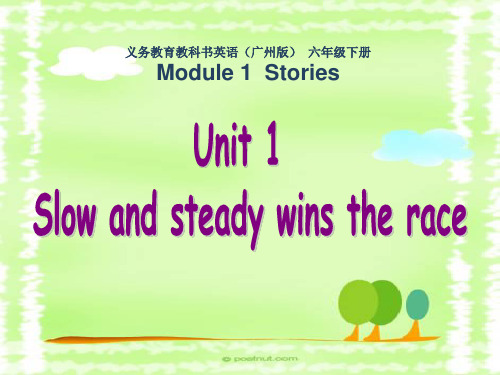
Fill in the blanks.
careless,careful,silly,slow, steady,proud, patient
1. Why are you in such a hurry? You are like
that ___s_il_ly______ hare.
2. The hare was sure he would win so he took a
dtihdonu'gthwt atnhtetboogooksbwacekretonotthehecalavys.sroom again.
2.( F ) Xiaoling thinks Jiamin is like the silly tohratroeise.
3.( T ) In the story The tortoise and the Hare, the slow
5. Remember, ___s_lo_w______ and __s_t_e_a_d_y_____
wins the race.
Let's match.
If you want to do something well,
you shoud keep a good diet.
If you want to speak good English,
/p r au d/
silly
hare tortoise mean meant
proud
/ k eE L E s / careless
/ P eI Snt / patient
/ sQd/
sad
/ RI membE / remember
/ H A: d / hard
/ k eE F L / careful
广州版小学英语六年级下册MODULE5UNIT14之三课件
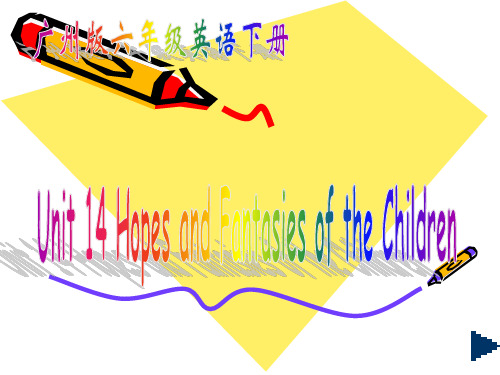
Write down your hopes for the Olympics !
the Little Star
What’s Little star’s wish? Who could be Little Star’s best friend? Was she happy at last? What did she want to do?
Please write your hopes and wishes to the Little Star
hope
wish
I’m Garfield. I am fat, but lovely . Everyone likes me. I like eating very much. I hope I can be a food taster. So I can eat all kinds of foods.
be angry.
• The little girl‘s fingers were stiff with cold. She took out a match and lit it to keep warm. She cupped her hand over it, and as she did so, she magically saw in its light a big brightly burning stove. The little girl wished she could keep out the cold. But, the match went out in a short t passage?
六年级英语知识点下册广州

六年级英语知识点下册广州广州是中国南方的一个大城市,也是广东省的省会城市。
在广州的六年级英语学习中,同学们将接触到许多重要的知识点。
下面是对这些知识点的整理和概述。
一、单词及短语1. Transportation(交通工具)在广州,有许多种交通工具可供选择,如地铁、公交车、出租车等。
2. Directions(方向)六年级的同学需要学习怎样问路和给出方向指引,例如"Walking Straight"(直走)或"Turn left"(向左转)。
3. Occupation(职业)了解一些常见的职业名称和相关的英文表达,如doctor(医生)、teacher(教师)等。
4. Weather(天气)广州的天气变化多端,学习词汇和表达方式来描述不同的天气情况,如sunny(晴朗的)、cloudy(多云的)等。
5. Food(食物)广州有着丰富多样的美食,学习相关词汇和短语,如rice(大米)、noodles(面条)等。
6. Daily Routine(日常活动)了解和学习描述日常活动的单词和短语,如get up(起床)、go to bed(上床睡觉)等。
二、语法知识1. 现在进行时(Present Continuous)学习在不同情境和时态中使用现在进行时来表达正在发生的事情,如"I am going to school"(我正在去学校的路上)。
2. 一般过去时(Simple Past)学习正确地使用一般过去时来描述发生在过去的动作和事件,如"He played soccer yesterday"(他昨天踢足球了)。
3. 比较级和最高级(Comparatives and Superlatives)学习比较级和最高级的构成和用法,如"bigger"(更大的)和"biggest"(最大的)。
广州英语六下unit2
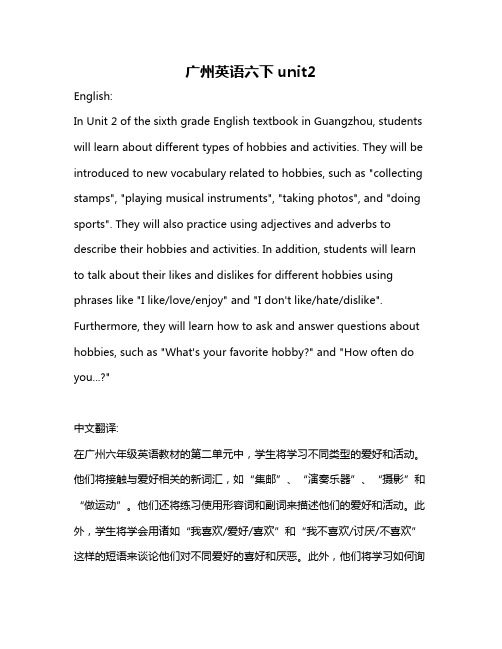
广州英语六下unit2English:In Unit 2 of the sixth grade English textbook in Guangzhou, students will learn about different types of hobbies and activities. They will be introduced to new vocabulary related to hobbies, such as "collecting stamps", "playing musical instruments", "taking photos", and "doing sports". They will also practice using adjectives and adverbs to describe their hobbies and activities. In addition, students will learn to talk about their likes and dislikes for different hobbies using phrases like "I like/love/enjoy" and "I don't like/hate/dislike". Furthermore, they will learn how to ask and answer questions about hobbies, such as "What's your favorite hobby?" and "How often do you...?"中文翻译:在广州六年级英语教材的第二单元中,学生将学习不同类型的爱好和活动。
广州版小学英语六年级下册各单元要点
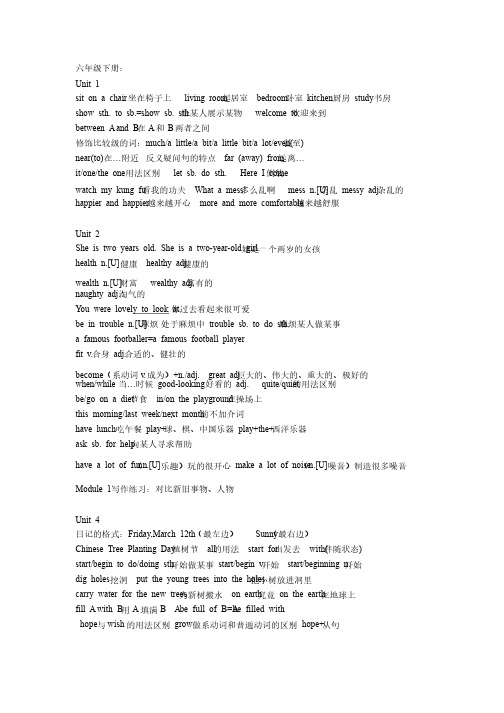
六年级下册:六年级下册:Unit 1 sit on a chair 书房起居室 bedroom卧室 kitchen厨房 study书房坐在椅子上 living room show sth. to sb.=show sb. sth.欢迎来到给某人展示某物 welcome to欢迎来到between A and B 在A和B两者之间 甚至) 修饰比较级的词:much/a little/a bit/a little bit/a lot/even(near(to)在…附近 反义疑问句的特点 far (away) from 远离…it/one/the one用法区别 let sb. do sth. Here I come倒装倒装watch my kung fu 看我的功夫 What a mess! 杂乱的多么乱啊 mess n.[U]杂乱 messy adj.杂乱的happier and happier越来越开心 more and more comfortable 越来越舒服 Unit 2 She is two years old. She is a two-year-old girl.她是一个两岁的女孩她是一个两岁的女孩health n.[U] 健康健康的健康 healthy adj.健康的wealth n.[U]财富 wealthy adj.富有的富有的naughty adj.淘气的淘气的淘气的Y ou were lovely to look at.你过去看起来很可爱 be in trouble n.[U]麻烦麻烦 处于麻烦中 trouble sb. to do sth.麻烦某人做某事麻烦某人做某事a famous footballer=a famous football player fit v.合身 adj.合适的、健壮的合适的、健壮的合适的、健壮的become(系动词v.成为)+n./adj. great adj.巨大的、伟大的、重大的、极好的巨大的、伟大的、重大的、极好的when/while 当…时候 good-looking 好看的好看的 adj. quite/quiet的用法区别的用法区别be/go on a diet 节食 in/on the playground 在操场上 this morning/last week/next month前不加介词前不加介词前不加介词have lunch吃午餐 play+球、棋、中国乐器 play+the+西洋乐器西洋乐器ask sb. for help向某人寻求帮助向某人寻求帮助 have a lot of fun(n.[U]乐趣)玩的很开心 make a lot of noise噪音)制造很多噪音(n.[U]噪音)制造很多噪音Module 1写作练习:对比新旧事物、人物写作练习:对比新旧事物、人物Unit 4 (最右边)日记的格式:Friday,March 12th(最左边) Sunny(最右边)Chinese Tree Planting Day 植树节 all的用法的用法 start for 出发去 with(伴随状态) start/begin to do/doing sth.开始做某事 start/begin v.开始开始开始 start/beginning n.开始dig holes 挖洞把小树放进洞里 挖洞 put the young trees into the holescarry water for the new trees 究竟 on the earth在地球上在地球上为新树搬水 on earth究竟在地球上 be filled with be full of B=Afill A with B 用A填满B A be full of B=A hope与wish的用法区别 grow做系动词和普通动词的区别 hope+从句从句plant some seeds in the pot 种一些种子在坛子里 some small shoots appear/come out 一些小芽出现了一些小芽出现了It It’’s time to pick up the fruit.(n.[U]水果)水果) 是捡起水果的时候了 pick v.摘、挑选 pick up 捡起捡起 She picks fruit off the tree. 她从树上摘下水果她从树上摘下水果on a plate/tray 在盘子/托盘上 keep a diary 记日记 help sb. a lot 帮助某人许多(v.+ a lot ) happen=take place 发生 leaf →leaves n.树叶树叶[C] Unit 5 by the road 在路边 in front of 在…的前边(外部)的前边(外部)crash into 撞上撞上 a car crash 一场车祸 cut down 砍倒砍倒 try to do努力做… let let’’s 中的’s 是us 不是is move …into 把…搬进… move v.移动、搬家 moving adj.感人的感人的 dig dig……out 把…挖出来 water the tree 给树浇水 save v.拯救、节约、节省拯救、节约、节省 save the broken tree 拯救损坏的树 broken adj.损坏的 this/that/these/those 指示代词指示代词Module 2写作练习:做一件事的过程,描述一天的活动做一件事的过程,描述一天的活动Unit 7 famous historical (adj.历史上的)=historic (adj.历史上著名的)历史上著名的)be born 出生,其后加的介词由所跟时间地点决定出生,其后加的介词由所跟时间地点决定the father of modern China 中国的现代之父 ancient adj.古代的古代的 mean v.意思是 What do/does/did …mean=What is/are/was/were the meaning of.. …的意思是? tell sb sth.=tell sth. to sb. 告诉某人某事 tell sb. about sth.告诉某人关于某事告诉某人关于某事 against prep.反对反对 change v .改变 n.变化变化[C] 零钱[U] free v.解放 adj.免费的、自由的,有空的免费的、自由的,有空的finally/at last/in the end 最后 宾语从句(that) the Dr Sun Y atsen Memorial Hall 孙中山纪念堂 all right 行 That ’s all right 不客气/没关系 That ’s right 对的对的对的 president n.总统总统 premier n.总理 the great leader of China 中国的伟大领导人中国的伟大领导人 make an important speech 做一个重要的演讲 It doesn ’t matter. 没关系没关系have gone to/have been to/have been in 用法区别用法区别Unit 8 that 的用法:上文提到的事物、人物 hero/heroine a lot of=lots of=plenty of +可数复数名词/不可数名词 大量大量大量 in the 14th century 在第14世纪 talk about sth. 谈论关于某事谈论关于某事live in the forest 住在森林 the poor 穷人 the+adj.表示一类人表示一类人+are give sth. to sb.=give sb. sth.给某人某物 from…to to……从…到…I think so. 我也这么认为 a cartoon of … …的卡通的卡通sth. be for free 某物是免费的 sth. be free for sb. 某物对某人是免费的 wood n.[U]木头 woods n.[C]森林森林the Olympics=the Olympic Games the Asian Games were held in Guangzhou. Lu Xun was a great Chinese writer.(n.[C]作家) Module 3写作练习:描写一个人物写作练习:描写一个人物Unit10 Chinese Ancient Fables 中国古代寓言中国古代寓言Let me see.让我看看/想想 library card 图书卡 How long may I keep it?(不能用borrow ,因为borrow 是瞬间性动词) borrow (借进) sth. from sb. lend sth.(借出)to sb. 回答how long 提问的句子:two days 两天 for two days 持续两天 mustn mustn’’t 禁止(can,may 表允许时的否定回答) renew (续借)(续借)(续借) in the fields 在田野 field n.田野、场地、领域[C] fall to the ground 摔在地面摔在地面 suddenly adv.突然地突然地take it back home(home,here,there 前不加介词前不加介词) cook v .烹饪 n.厨师厨师 cooker n.炊具炊具 To pick up a hare is certainly easier than to work in the fields 比较的结构要一致比较的结构要一致 from then on 从那时起 from now on 从现在起 say to oneself 自言自语 not …any more 与no more 的互换 not …any 与no 的互换的互换 all day long 一整天 all the year round 一整年 wait for a hare to appear 等待一只野兔出现等待一只野兔出现 wait 的相关题型 can,may,must 表情绪,表允许的用法及否定回答 kind n.种类种类[C] adj.友善的友善的 a kind of 一种… all kinds of 所有种类的… kind of+adj./adv. 有点儿有点儿 be kind to 对…友善友善Unit11 look for 寻找(强调动作)寻找(强调动作) run into跑步撞到 look at 看 like v.喜欢 prep.像…一样 the great king of the animal 万兽之王万兽之王That That’’s very good of you. It is+adj.+for/of sb. to do sth. The mouse was again looking for something to eat. 老鼠再一次寻找吃的东西老鼠再一次寻找吃的东西 v.+again adv.再一次 one more cup of coffee=another one cup of coffee under a tree 在一棵树下 in a net 在一个网中 get out of 从…出来出来go/come up to.. 去/来到…面前 Don ’t worry 不要着急不要着急 make a big hole 弄出一个大洞弄出一个大洞 eat up 吃光吃光 at first=at the beginning 在起初 if 引导的条件状语从句用于“主将从现”引导的条件状语从句用于“主将从现” answer one ’s question 回答某人的问题回答某人的问题 of the three 在三者之中(最高级)在三者之中(最高级)Module 4 写作练习:讲一个故事,如续写乌鸦喝水的故事写作练习:讲一个故事,如续写乌鸦喝水的故事写作练习:讲一个故事,如续写乌鸦喝水的故事Unit13 hope 与wish 的用法区别 宾语从句(I ’m sure/afraid that ) I hope so.我希望如此(so 代指上文提到的)代指上文提到的) Well done. 做的好 want to do sth.想要做… I want to be a runner. grow up 长大 run for China 为中国奔跑 in the 2012 Olympic Games in London 在2012年在伦敦的奥运会年在伦敦的奥运会有地点状语,时间状语,先写地点状语再写时间状语有地点状语,时间状语,先写地点状语再写时间状语Good luck 祝你好运祝你好运 fall over 摔倒 on the floor 在地板上 on the second floor 在第二层在第二层 dream about 梦想 be good at=do well in+doing 擅长于做.. 职业:ambulance ambulance man man 救护人员救护人员 nurse 护士护士 doctor 医生医生 policeman 男警察男警察 post post man man 邮递员 factory worker 工厂工人工厂工人 soldier 士兵士兵 farmer 农夫农夫cook 厨师 fireman 消防员消防员消防员Unit14 act out the dialogue 演出对话演出对话 act in pairs 两人一组表演 go to see a film 去看电影 the film about the Monkey King 关于猴王的电影关于猴王的电影 Me too.我也是我也是 That ’s fantastic.那太棒了那太棒了那太棒了 have fun= have a good time=enjoy oneself 玩的开心玩的开心magic stick 魔棒魔棒 It ’s time for you to go home.现在是你回家的时间现在是你回家的时间 take/have a look at 看一看 run away 跑开 meet at eight or ten o ’clock 在8点或10点见面点见面 There is a pair of shoes. 就近原则,量词+名词的组合以量词为判断依据名词的组合以量词为判断依据 词形变化:词形变化:farm → farmer write →writer report →reporter walk →walker garden →gardener any 用于肯定句翻译为“任何”用于肯定句翻译为“任何”Module 5写作练习:描述梦想或幻想(hope 或wish) 。
广州六年级英语下册知识点

广州六年级英语下册知识点广州六年级英语下册的知识点涵盖了多个方面,包括词汇、语法、听力、口语、阅读和写作。
以下是一些核心知识点的概述:词汇学习- 学习与日常生活相关的词汇,如家庭成员、学校设施、日常活动等。
- 掌握一些基本的形容词和副词,如big, small, quickly, slowly 等。
- 学习一些基本的动词短语,例如look up, turn on, take off等。
语法要点- 学习一般现在时、一般过去时和一般将来时的用法。
- 掌握名词的单复数形式,以及名词所有格的构成。
- 学习使用现在进行时来描述正在进行的动作。
- 理解并使用简单的条件句,如“If it rains, we will stay at home.”听力技巧- 通过听力练习提高对英语语音和语调的识别能力。
- 学习如何从对话或短文中提取关键信息。
口语表达- 练习日常对话,如问候、介绍、询问时间等。
- 学习如何用英语描述自己的喜好、计划和经历。
阅读理解- 阅读简单的英语故事、短文或对话,理解大意和细节。
- 学习如何通过上下文猜测生词的意思。
写作技能- 学习写简单的句子和段落,如自我介绍、描述一天的活动等。
- 练习写日记或书信,表达个人情感和观点。
文化知识- 了解一些英语国家的文化习俗,如节日庆祝方式、饮食习惯等。
复习和测试- 定期复习所学知识,通过练习题和模拟测试来巩固学习成果。
结束语六年级的英语学习是一个重要的阶段,它为学生打下了坚实的基础,为今后更高级的英语学习做好准备。
通过不断的练习和应用,学生们可以更加自信地使用英语进行交流。
希望以上的知识点能够帮助学生们更好地掌握六年级英语下册的内容。
六年级下册广州版英语第二课单词

六年级下册广州版英语第二课单词1. clean [kliːn].- 词性:动词(v.)和形容词(adj.)。
- 出处:课本中用于描述周末的活动,如“I cleaned my room.”- 解释:- 作为动词,意为“打扫;清洁;使干净”。
- 作为形容词,意为“干净的;整洁的”。
- 造句:- 动词:She cleans the house every weekend.(她每个周末都打扫房子。
)。
- 形容词:The classroom is very clean.(教室非常干净。
)。
- 近义词:tidy(整洁的)、neat(整齐的)。
- 反义词:dirty(脏的)。
2. wash [wɒʃ] (英) [wɑːʃ] (美)。
- 词性:动词(v.)。
- 出处:常见于描述日常生活活动的语境,如“I washed my clothes.”- 解释:洗;洗涤。
- 造句:He washes his face every morning.(他每天早上洗脸。
)。
- 近义词:cleanse(使清洁;净化)。
- 反义词:dirty(弄脏)。
3. stay [steɪ].- 词性:动词(v.)。
- 出处:用于描述在某个地方停留或逗留的情况,例如“I stayed at home.”- 解释:停留;逗留;待。
- 造句:They stayed in the hotel for a week.(他们在酒店住了一周。
)。
- 近义词:remain(逗留;停留)。
- 反义词:leave(离开)。
4. home [həʊm] (英) [hoʊm] (美)。
- 词性:名词(n.)和副词(adv.)。
- 出处:在描述地点或回家的动作时经常出现,如“I went home.”- 解释:- 作为名词,意为“家;住宅”。
- 作为副词,意为“在家;回家;到家”。
- 造句:- 名词:My home is near the school.(我家在学校附近。
- 1、下载文档前请自行甄别文档内容的完整性,平台不提供额外的编辑、内容补充、找答案等附加服务。
- 2、"仅部分预览"的文档,不可在线预览部分如存在完整性等问题,可反馈申请退款(可完整预览的文档不适用该条件!)。
- 3、如文档侵犯您的权益,请联系客服反馈,我们会尽快为您处理(人工客服工作时间:9:00-18:30)。
三合一检测一、写出下列动词的过去式。
1. plant2. water3. try4. fill5. save6. happen7. hope 8. carry 9. begin10. dig 11. keep 12. put二、根据图片和首字母提示,把句子补充完整。
1. I was s when I got the present.2. I v the m last week.3. She h her mother c the house yesterday.4. I was very angry when someone c d the tree.5. Last night, a car c i the tree.6. The farmers are p the f now.三、用适当的单词补全对话。
A: you plant trees last Tree Planting Day?B: Yes, we .A: did you plant the trees?B: Behind our school library.A: What trees you plant?B: We planted peach trees.A: you going to plant trees this Tree Planting Day?B: Yes, we .A: I go with you?B: Of you can.When引导的时间状语从句表中句子是状语从句,由从属连词“when”作引导的从句,用以修饰前面的形容词。
分音节如何分音节:两个元音之间只有一个辅音,该辅音就归后面的音节,如果两个元音之间有两个辅音的,就前后音节各一个,例如:wel—come / ap—ple / bet—ter / hap—pen a—gainst / be—gin / me—mor—ial / pa—per 重读音节英语单词一般有两个以上音节,有的音节读得重而清楚,叫重读音节;有的读得清而含糊,叫非重读音节。
单音节词只有一个音节,在单独读音时须重读,但不用标重音符号“,”。
双音节词和多音节词中的重读音节用重音符号标出,重读符号放在重读音节的左上角。
巩固练习一、找出每组单词中不同类的一项。
()1. A. saved B. watered C. planted D. broken()2. A. earth B. dig C. fill D. put()3. A. seed B. leaf C. fruit D. pick()4. A. surprised B. sad C. carry D. angry()5. A. taller B. player C. bigger D. closer二、用括号内所给动词的适当形式填空。
1. Jiamin (go) swimming last Sunday morning.2. What he (do) yesterday?3. Tom (visit) the museum next week.4. They (feel) excited when the shoots appeared.5. Janet’s mother usually (do) housework in the evening.6. Look at the children, they (paint) a picture in the garden.7. I (clean) the house the day before yesterday.8.—What is the boy doing? --He (play) football.9. Ben and his parents (have) a party tomorrow evening.三、选择正确的答案填空。
()1. Mrs Smith will start Beijing tonight.A. forB. atC. for()2. They put the young trees the holes and filled the holes earth.A. into, withB.on, withC. into, to()3. All of us hope the trees grow well.A. will beB. willC. is going to()4. My father didn’t the flowers last night.A. wateredB. watersC. water()5. It’s time have lunch. Wsah your hands, children!A. ofB. toC. for()6. Last night a bus carshed the tree.A. withB. intoC. on()7. We many trees next Tree Palnting Day.A. plantB. plantedC. are going to plant()8. All of us felt tired when we the work.A. finishB. finishedC. finishes()9. On Sunday Sally usually helps her mother the house.A. cleanB. cleansC. cleaning()10. The doctor tried the old man last night.A. saveB. to saveC. saves四、按照实际情况回答问题。
1. Did you plant any trees last year?2. Do you keep a diary?3. Can you plant trees?4. Are you going to plant more trees next year?5. What did you do yesterday?小升初链接——介词和数词介词详解一、概述介词是英语中很活跃的词,一般置于名词之前。
它常和名词或名词性词语构成介词短语。
同一个介词常和不同的词语搭配形成固定搭配,表示不同意义。
二、常用介词的基本用法at①表示时间:I go to school at seven every day 我每天早上7点去上学。
②表示在某一具体地点:He is standing at the bus stop 他站在公共汽车站。
③表示动作的方向、目标:Let me have a look at the picture 让我看看这幅图。
④用于某些固定搭配:at last 最后at the same time 同时not at all 一点也不about①表示大约时间:It’s about six o'clock now. 现在大约6点钟了。
②关于,对于:We are talking about the news. 我们正在谈论新闻。
after①在……之后:After dinner I watch TV. 晚饭后我看电视。
②在……后面:He came into the room after me. 他在我后面进了房间。
behind①在……之后:There is a bike behind the tree. 树后有一辆自行车②比……晚,迟于:The train is behind time. 火车晚点了by①在……旁:He is sitting by the bed. 他正坐在床边。
②到……时候:We have learned three English songs by now. 到现在为止,我们已经学会了三首英文歌曲。
③以……方式:I go to school by bus. 我乘公共汽车去上学。
④用于某些固定搭配:one by one一个接一个by the way顺便说一句for①为,给,替:I'll make a card for my teacher. 我要给老师做张卡片。
③表示给(某人)用的:There is letter for you. 这儿有你一封信。
in①在……里面:The pencil is in the desk. 铅笔在课桌里。
③用,以:What's this in English? 这用英语怎么说?④在某一年份,季节,月份:in 2002, in spring, in January⑤表示状态,服饰:Helen is in yellow. 海伦身穿黄色衣服。
⑦用于某些固定搭配:in front of在……前面in the end最后in time及时like①像……样:He looks like his father. 他像他的父亲。
③怎样:What's the weather like? 天气怎样。
near靠近,在……附近:My bed is near the window. 我的床在窗户旁。
of②……的(用于所有格):He is a friend of mine. 他是我的一个朋友。
③表示数量(与连词连用):One of us is from Beijing. 我们中有一个来自北京on①在……上面:There are some apple on the tree. 树上有些苹果。
②在(星期)天,在某天的上午(下午,晚上):They go to English class on Sunday.③用于某些固定搭配:on duty值日on time 准时over②遍及,穿过:There is a bridge over the river. 有座桥横跨那条河。
③超过,不止:She is a little over 2. 她两岁多了。
to①到,往,向:He walks to the window. 他走向窗户。
②表示时间、数量,到……为止Please count from ten to thirty. 请从10数到30.③向,对,给:Happy New Year to you all. 大家新年好。
underWhat's under your desk? 你书桌底下是什么?with①和,写:Could you go home with me? 你能和我一起回家吗?②表示伴随状态,带有:Who's that girl with glasses? 那位戴眼睛的女孩是谁?总结:■表示方位的介词:in, to, on1. in 表示在某地范围之内。
如:Shanghai is/lies in the east of China. 上海在中国的东部。
